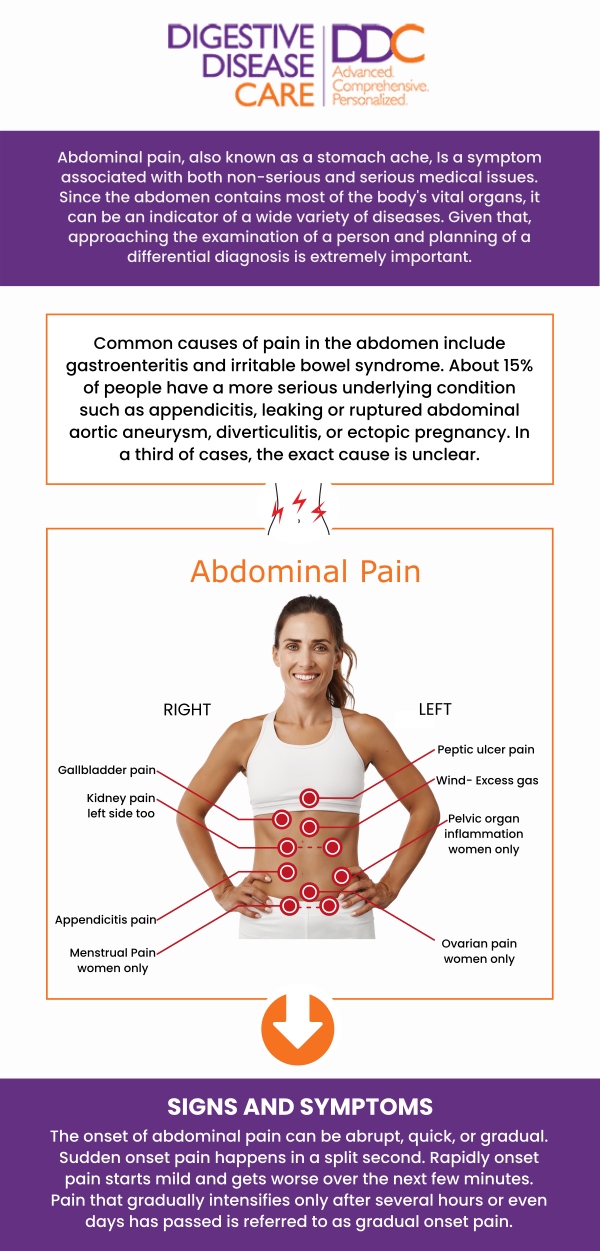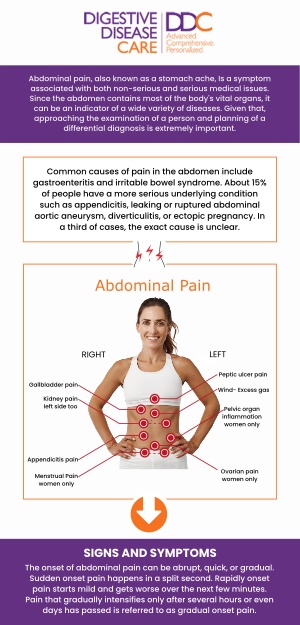Abdominal Pain: Diagnosis and Evaluation
Abdominal pain requires a thorough evaluation to identify its cause, ranging from minor issues to serious conditions. A doctor will assess the pain’s location, intensity, and associated symptoms. At Digestive Disease Care (DDC), our board-certified doctors provide accurate diagnoses and personalized treatment plans for effective relief. For more information, please contact us or book an appointment online. We have convenient locations to serve you in Babylon NY, East Setauket NY, Forest Hills NY, Jericho NY, Lake Success NY, Melville NY, Mineola NY, Massapequa NY, New Hyde Park NY, and Riverhead NY.


Table of Contents:
What are the common causes of abdominal pain?
How is abdominal pain diagnosed by a doctor?
What tests are typically used to diagnose abdominal pain?
What questions are asked during an abdominal pain exam?
Abdominal pain can have many different causes, ranging from mild, temporary issues to more serious medical conditions. The location, type, and duration of pain can offer clues about the underlying cause. Some cases are related to digestive issues, while others may involve organs like the kidneys or the reproductive system.
Common causes of abdominal pain include:
• Indigestion or gas from overeating or consuming spicy or fatty foods
• Constipation, which causes cramping and discomfort due to slow bowel movement
• Gastroenteritis (stomach flu), often caused by viral or bacterial infections
• Food intolerances such as lactose or gluten sensitivity
• Irritable bowel syndrome (IBS) or inflammatory bowel disease (IBD)
• Gallstones or gallbladder inflammation (cholecystitis)
• Kidney stones or urinary tract infections
• Appendicitis, which usually causes pain in the lower right abdomen
• Hernias or abdominal muscle strain
Sometimes, stress or anxiety can also trigger abdominal discomfort. Because the abdomen houses many organs, identifying the exact cause requires a careful evaluation of symptoms and sometimes diagnostic testing. If abdominal pain is sudden, severe, or persistent, it’s important to seek medical attention promptly. Early evaluation can help prevent complications, especially in cases involving infection, inflammation, or obstruction. Accurate diagnosis leads to more effective treatment and relief of discomfort.
Diagnosing abdominal pain involves a combination of clinical evaluation, physical examination, and sometimes diagnostic testing. A doctor begins by collecting a detailed history of the patient’s symptoms, followed by a hands-on abdominal exam to assess pain location, tenderness, and possible swelling or masses.
The diagnostic process includes:
• Listening to the patient’s description of the pain: its onset, duration, intensity, and location
• Assessing associated symptoms, such as nausea, fever, diarrhea, or changes in bowel habits
• Performing a physical exam, including palpation to detect tenderness or rigidity
• Evaluating medical history, such as prior abdominal surgeries, digestive issues, or gynecological problems
• Considering patient demographics, like age and gender, which influence the likelihood of certain conditions
If the pain is mild and clearly related to diet or activity, no further testing may be needed. However, persistent or unclear pain usually requires additional evaluation. Doctors may also consider whether the pain is acute (sudden onset) or chronic (recurring over time), as this affects the diagnostic approach. For example, acute pain may suggest appendicitis, while chronic pain might point toward irritable bowel syndrome or food intolerance. A thorough evaluation ensures the appropriate treatment and prevents complications.
When the cause of abdominal pain is not immediately clear from a physical exam and history, doctors may order tests to get more information. These tests help evaluate organ function, identify infections, or detect structural problems within the abdomen. The choice of tests depends on the suspected condition.
Common tests used to diagnose abdominal pain include:
• Blood tests to check for signs of infection, inflammation, liver or kidney function, and anemia
• Urinalysis to detect urinary tract infections or kidney issues
• Stool tests to check for infections, blood, or digestive disorders
• Ultrasound to view organs like the gallbladder, kidneys, liver, or uterus
• X-rays to detect bowel obstruction, perforations, or abnormal gas patterns
• CT scan for a more detailed view of abdominal organs, often used in emergencies
• Endoscopy or colonoscopy to visually examine the digestive tract
These tests are selected based on the patient’s symptoms and physical findings. For example, if appendicitis is suspected, a CT scan is often preferred. If gallstones are a concern, an ultrasound may be the first step. Test results help confirm the diagnosis, guide treatment, and identify any serious or life-threatening conditions requiring immediate attention.
During an abdominal pain exam, a healthcare provider will ask detailed questions to help determine the cause and seriousness of your symptoms. These questions aim to gather information about the nature, timing, and associated features of the pain. Your answers guide the doctor in deciding which physical exams or tests may be necessary for further evaluation.
Key questions often include:
• Where is the pain located? Upper, lower, right, or left side of the abdomen
• When did the pain start? Sudden onset or gradual development
• How would you describe the pain? Sharp, dull, crampy, burning, or throbbing
• Does the pain come and go, or is it constant?
• What were you doing when the pain began? Eating, exercising, resting, etc.
• What makes the pain worse or better? Such as movement, food, rest, or medication
• Are there any other symptoms? Fever, nausea, vomiting, bloating, diarrhea, constipation, or weight loss
• Have you had similar pain before? If yes, what caused it, and how was it treated
• Do you have any chronic conditions? Such as ulcers, gallstones, or gastrointestinal diseases
• Are you taking any medications or supplements?
These questions help narrow down potential causes, whether they’re related to digestive, urinary, reproductive, or other abdominal organs. Honest and thorough answers support an accurate diagnosis and effective care plan. For more information, please contact us or book an appointment online. We have convenient locations to serve you in Babylon NY, East Setauket NY, Forest Hills NY, Jericho NY, Lake Success NY, Melville NY, Mineola NY, Massapequa NY, New Hyde Park NY, and Riverhead NY.

Check Out Our 5 Star Reviews


Additional Services You May Like

Additional Services You May Like
- Abdominal Pain
- Acid Reflux
- Barretts Esophagus
- Bloating
- Capsule Endoscopy
- Celiac Disease
- Colon Cancer Screening
- Colonoscopy
- Constipation
- Crohns Disease
- Diarrhea
- Diverticulitis
- Esophageal PH Monitoring
- Fatty Liver
- Fibroscan
- Gallstones
- Gastroenterologist
- Gastric Chest Pain
- Gluten Intolerance
- Hemorrhoid
- Hemorrhoid Banding
- Hepatitis
- Irritable Bowel Syndrome
- Lactose Intolerance
- Pancreatitis
- Polyps
- Rectal Bleeding
- Stomach
- Ulcerative Colitis
- GI Urgent Care





